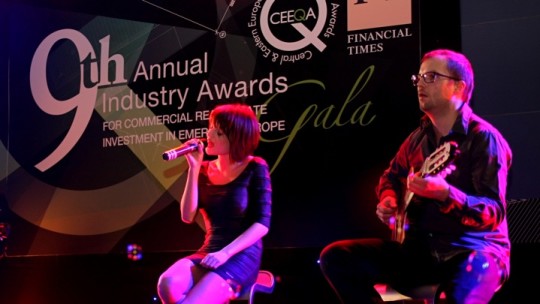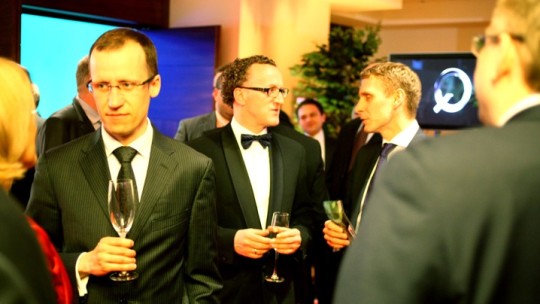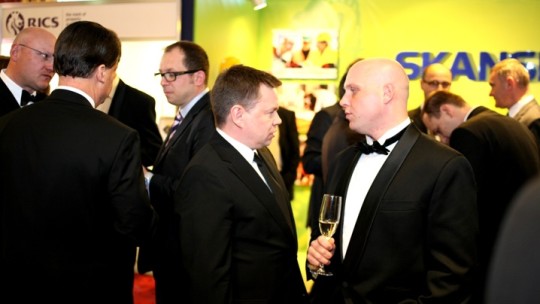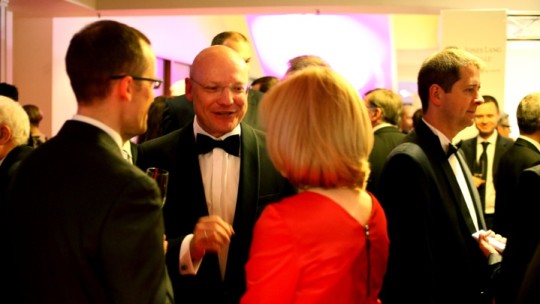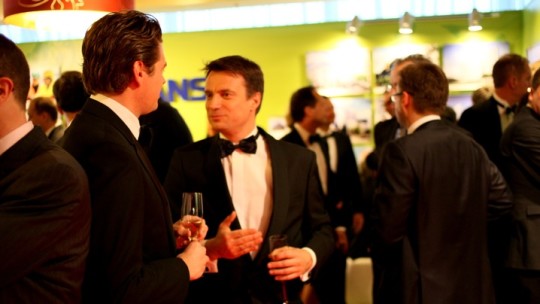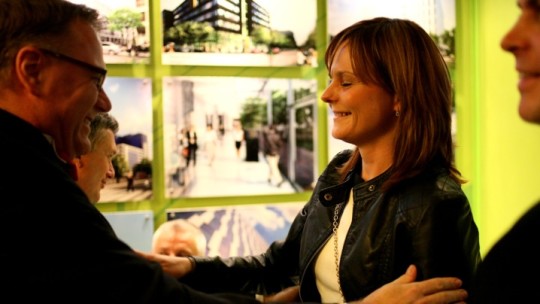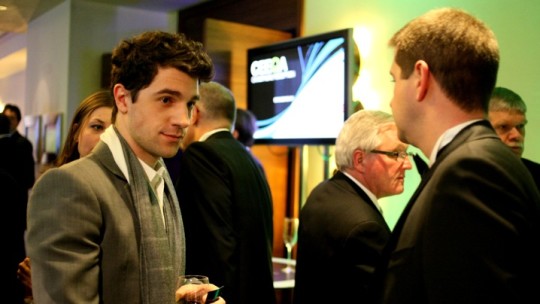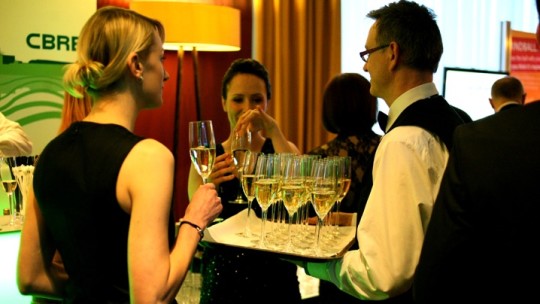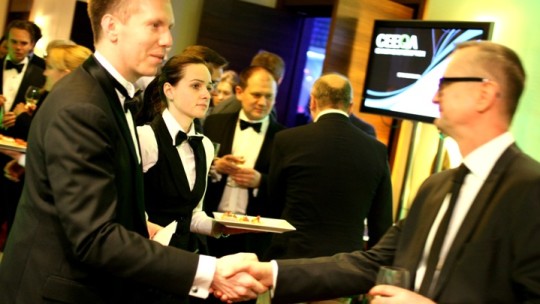RealGreen Symposium & Fair
Insight Summit — Warsaw Marriott Hotel, 17th April 2012
Unlocking the business case for green building
Money taking over from ethics as the key driver for green building and investment.
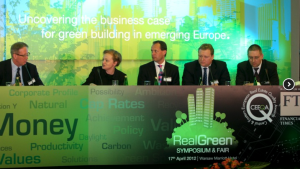 More than 100 business leaders and sustainability experts engaged in the New Europe commercial property sector gathered for a series of presentations, discussions, panel debates and an exhibition of green building ideas and services at the Warsaw Marriott Hotel on 17th April 2012 for an all day symposium preceding the ninth annual CEEQA Gala. The event, hosted by popular Polish television presenter Monika Richardson and chaired by Norton Rose partner David Dixon, also saw the presentation of four new CEEQA awards for green building and CRE investment in the region.
More than 100 business leaders and sustainability experts engaged in the New Europe commercial property sector gathered for a series of presentations, discussions, panel debates and an exhibition of green building ideas and services at the Warsaw Marriott Hotel on 17th April 2012 for an all day symposium preceding the ninth annual CEEQA Gala. The event, hosted by popular Polish television presenter Monika Richardson and chaired by Norton Rose partner David Dixon, also saw the presentation of four new CEEQA awards for green building and CRE investment in the region.
Green building, far from being an operational burden, is taking over as a driver of value for developers, investors and tenants of commercial buildings as the business case continues to crystallise, was the resounding message of the event. However the private sector should not be left to find the solutions on its own and more regional and national political leadership is required to fast track this sea change in the green building debate.
Creating, saving and protecting value
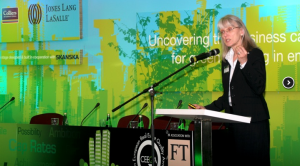 Lauralee Martin, Chief Operating and Financial Officer for global real estate consulting group Jones Lang LaSalle, supported the view that financial considerations were gradually superseding ethical considerations, citing the case of the green retrofit of the Empire State Building where only 12% of the retrofit budget was dedicated to green solutions, yet resulted in significant operational cost savings and contributed significantly to an improvement in tenant appeal resulting in almost a doubling of rental income from the building – which she described as “true value creation.” Martin’s presentation also focused on the long term future proofing value to built assets as well as companies, in a changing business climate where failure to adapt to the new paradigm could be costly in the future, however unquantifiable that may seem today.
Lauralee Martin, Chief Operating and Financial Officer for global real estate consulting group Jones Lang LaSalle, supported the view that financial considerations were gradually superseding ethical considerations, citing the case of the green retrofit of the Empire State Building where only 12% of the retrofit budget was dedicated to green solutions, yet resulted in significant operational cost savings and contributed significantly to an improvement in tenant appeal resulting in almost a doubling of rental income from the building – which she described as “true value creation.” Martin’s presentation also focused on the long term future proofing value to built assets as well as companies, in a changing business climate where failure to adapt to the new paradigm could be costly in the future, however unquantifiable that may seem today.
 This point was echoed in a later presentation by Karol Bartos, Poland Country Manager of investor MGPA, which bought the sector’s iconic new office building Rondo 1 in Warsaw shortly before the global economic crisis. Rather than a further drain on the investment, the company saw the first Leed Gold retrofit of an office tower in Europe as a value-add strategy to protect the value of the investment through lower operational cost savings and increased rental income, translating into improved asset value. “Most of it was cheap to implement but produces big savings… our target was to maintain price position in the Warsaw office market. Reduced occupancy costs can result in future rent increases”, said Bartos.
This point was echoed in a later presentation by Karol Bartos, Poland Country Manager of investor MGPA, which bought the sector’s iconic new office building Rondo 1 in Warsaw shortly before the global economic crisis. Rather than a further drain on the investment, the company saw the first Leed Gold retrofit of an office tower in Europe as a value-add strategy to protect the value of the investment through lower operational cost savings and increased rental income, translating into improved asset value. “Most of it was cheap to implement but produces big savings… our target was to maintain price position in the Warsaw office market. Reduced occupancy costs can result in future rent increases”, said Bartos.
The head of sustainability for global built asset consultancy EC Harris, Nick Hayes, provided a presentation focused exclusively on the value generated through operational costs savings, commenting: “The market recognises green, but is still not certain how much money and effort to put into it, but it is becoming clear that it saves money, carbon and reduces risk and demonstrates brand leadership.”
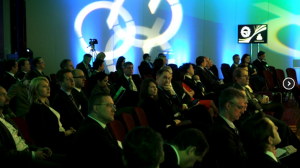 While panelists Luciano Capaldo, Chairman of RICS Europe, and David Chayton, regional head of investor added a note of market realism, agreeing there was still a fear of the green premium that the business case has to answer in more quantifiable terms – a point echoed by Roger Andersson, Country Manager of Swedecenter and developer of the ambitious Business Garden project in Poland, who commented “instead of stretching the technology envelope, existing building techniques used well can already deliver a green building.” However, Daniel Harris of Tristan Capital Partners said green building “is not the investment strategy itself but is part of our investment strategy – we can’t ignore it. Green will certainly be an opportunity for us to add value in the future.”
While panelists Luciano Capaldo, Chairman of RICS Europe, and David Chayton, regional head of investor added a note of market realism, agreeing there was still a fear of the green premium that the business case has to answer in more quantifiable terms – a point echoed by Roger Andersson, Country Manager of Swedecenter and developer of the ambitious Business Garden project in Poland, who commented “instead of stretching the technology envelope, existing building techniques used well can already deliver a green building.” However, Daniel Harris of Tristan Capital Partners said green building “is not the investment strategy itself but is part of our investment strategy – we can’t ignore it. Green will certainly be an opportunity for us to add value in the future.”
Jeroen Van der Toolen, head of Ghelamco, one of the most successful office developers in the region, said that while tenant demand was not yet driving his company’s conversion to green, he was certain that his company is going to make money by going green: “We are still not seeing tenants and developers investing together. We are hearing from tenants that it’s great that you have a green building, but it’s not a decision maker. However, we are seeing a shift, especially on the part of multi-nationals. But when you implement green solutions and bring down the cost of energy – which is 30 per cent of the cost of running a building – that’s hard evidence,” he said.
Occupier perspective
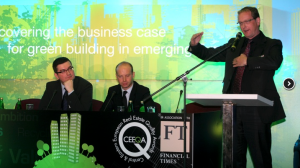 The ‘global occupier’ view was also at the centre of presentations by Deutsche Bank and Cisco Systems. Ranier Blank, global head of occupancy strategy for Deutsche Bank made the case for green building that was tied as much to ethics as to the bottom line: “When you use every available technique you can show what is possible even in a building that is more than 20 years old,” he said of DB’s decision to retrofit its Frankfurt headquarters. Bas Boorsma of Cisco Systems laid out the impact of their ‘smart work’ office strategies being developed by Cisco themselves on their workforce recruitment and productivity: “The goal is to create a smart work centre within 15 minutes bike ride of every Dutch professional – the next Steve Jobs is not working in a garage, he may be working in a smart centre.”
The ‘global occupier’ view was also at the centre of presentations by Deutsche Bank and Cisco Systems. Ranier Blank, global head of occupancy strategy for Deutsche Bank made the case for green building that was tied as much to ethics as to the bottom line: “When you use every available technique you can show what is possible even in a building that is more than 20 years old,” he said of DB’s decision to retrofit its Frankfurt headquarters. Bas Boorsma of Cisco Systems laid out the impact of their ‘smart work’ office strategies being developed by Cisco themselves on their workforce recruitment and productivity: “The goal is to create a smart work centre within 15 minutes bike ride of every Dutch professional – the next Steve Jobs is not working in a garage, he may be working in a smart centre.”
However an important caveat in the progress of the business case was outlined by the key note speaker, Lauralee Martin, as well as by Caroline May of Norton Rose, the law firm’s Partner responsible for environment, safety and planning – the need for greater political leadership.
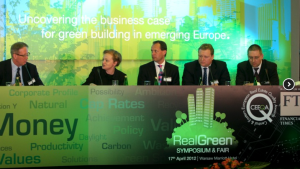 In a presentation laying out the regulatory issues of green building, May noted: “It’s easier to achieve economies of scale in public projects and more difficult in the private sector” as the problem is getting investors because of the long return period. A problem of scale also exists across the EU, which is fractured into small and widely varying markets, which makes it imperative to set Union-wide regulations. “We need real political leadership to do this,” she said. Martin, while lauding the role the ‘money incentive’ can play in the progress of the issue, commented: “Unfortunately governments around the world haven’t given us those rules and the industry has had to move forward on its own.”
In a presentation laying out the regulatory issues of green building, May noted: “It’s easier to achieve economies of scale in public projects and more difficult in the private sector” as the problem is getting investors because of the long return period. A problem of scale also exists across the EU, which is fractured into small and widely varying markets, which makes it imperative to set Union-wide regulations. “We need real political leadership to do this,” she said. Martin, while lauding the role the ‘money incentive’ can play in the progress of the issue, commented: “Unfortunately governments around the world haven’t given us those rules and the industry has had to move forward on its own.”
Commenting on the success of the event, CEEQA Director Richard Hallward said: “From the discussion and presentations today, while we can see that the money side of the sustainability question is becoming clearer, and there is more to be done both by the private sector and through greater government leadership and regulation, it is becoming increasingly clear that the financial dimensions of the issue are what will drive it forward, arguably far more than the ethical dimensions of the issue. I think this event captured that and we look forward to digging further into this in future RealGreen events.”
Awards for achievement in green building & investment
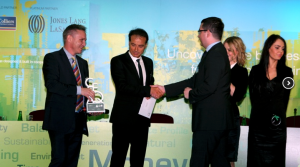 The presentations and panel discussions were followed by the presentation of four new CEEQA awards for green building and investment in the region. The award for RealGreen Building of the Year was won by MGPA’s retrofit of Warsaw’s Rondo 1 office building, with MGPA also picking up the award for RealGreen investor of the Year. The award for RealGreen Developer of the Year was won by Skanska Commercial Development Europe for their leadership of the issue in the region, while advisor Jones Lang LaSalle were given the award for RealGreen Service Provider of the Year. The awards were judged by the CEEQA Jury alongside the main CEEQA awards, the judging was supervised by globally respected consulting firm Deloitte.
The presentations and panel discussions were followed by the presentation of four new CEEQA awards for green building and investment in the region. The award for RealGreen Building of the Year was won by MGPA’s retrofit of Warsaw’s Rondo 1 office building, with MGPA also picking up the award for RealGreen investor of the Year. The award for RealGreen Developer of the Year was won by Skanska Commercial Development Europe for their leadership of the issue in the region, while advisor Jones Lang LaSalle were given the award for RealGreen Service Provider of the Year. The awards were judged by the CEEQA Jury alongside the main CEEQA awards, the judging was supervised by globally respected consulting firm Deloitte.
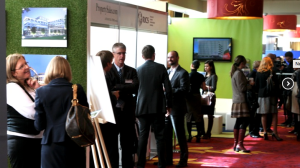 A small but high-powered fair involving many of the sector’s leading companies and organisations was organized as part of the event, including: Jones Lang LaSalle, Skanska, Deloitte, Norton Rose, Ghelamco, Colliers International, RICS, SwedeCenter, CBRE, EC Harris, Cushman & Wakefield, Strabag, Savills and the Financial Times.
A small but high-powered fair involving many of the sector’s leading companies and organisations was organized as part of the event, including: Jones Lang LaSalle, Skanska, Deloitte, Norton Rose, Ghelamco, Colliers International, RICS, SwedeCenter, CBRE, EC Harris, Cushman & Wakefield, Strabag, Savills and the Financial Times.
The event was concluded with the presentation of four new CEEQA awards for green building and investment in the region. The award for RealGreen Building of the Year was won by MGPA’s retrofit of Warsaw’s Rondo 1 office building, with MGPA also picking up the award for RealGreen investor of the Year. The inaugural RealGreen Developer of the Year was Skanska Commercial Development Europe for their leadership of the issue in the region, while architects Chapman Taylor picked up what proved to be only their first award of the day with RealGreen Service Provider of the Year. The awards were judged by the CEEQA Jury alongside the main CEEQA awards, the judging was supervised by globally respected consulting firm Deloitte.
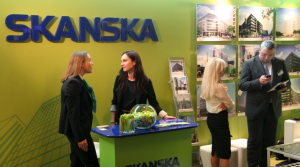 A small but high-powered fair involving many of the sector’s leading companies and organisations was organized as part of the event, including: Jones Lang LaSalle, Skanska, Deloitte, Norton Rose, Ghelamco, Colliers International, RICS, SwedeCenter, CBRE, EC Harris, Cushman & Wakefield, Strabag, Savills and the Financial Times.
A small but high-powered fair involving many of the sector’s leading companies and organisations was organized as part of the event, including: Jones Lang LaSalle, Skanska, Deloitte, Norton Rose, Ghelamco, Colliers International, RICS, SwedeCenter, CBRE, EC Harris, Cushman & Wakefield, Strabag, Savills and the Financial Times.

